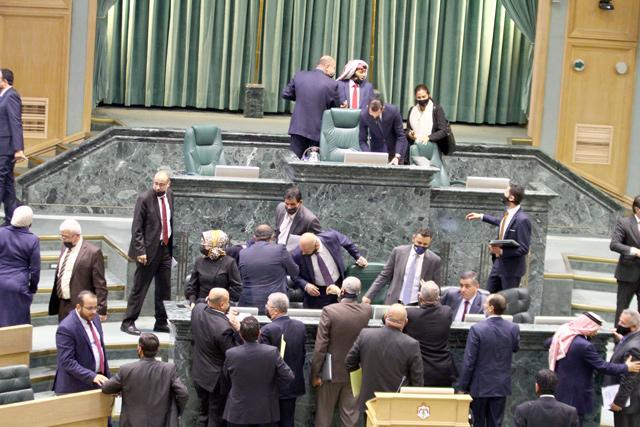- Local News
- Mon-2021-02-15 | 03:58 pm

The Lower House, headed by Speaker Abdulminem Oddat, and in the presence of Prime Minister and Minister of Defence Bisher Al Khasawneh and Cabinet members, discussed the two draft laws of the general budget and budgets of government units for the fiscal year 2021, the Jordan News Agency, Petra, reported.
The Parliamentary Finance Committee approved the two bills after discussions over three weeks, deciding to reduce expenditures by JD148 million, in addition to making 16 other recommendations to the government.
The 2021 budget predicts a 2.5 per cent growth in the economy, and an estimated deficit of JD2.05 billion after counting grants, compared with JD2.1 billion last year. Furthermore, the total expenditures item in the budget amounts to JD9.93 billion, compared with JD9.36 billion last year.
The value of the expected revenues is JD7.8 billion, compared with JD7.2 billion in 2020.
The current year budget expects a decrease in foreign grants estimating them to total JD577 million, compared with JD851 million last year.
The Lower House set a period of 10 minutes for each deputy, and 15 minutes for each spokesperson representing each parliamentary bloc.
The first speaker, MP Abdul Salam Thiabat, pointed to the lack of government plans to address the deficit other than raising prices and taxes and reducing expenditures, stressing the importance of investing in natural resources such as uranium, copper and other minerals, in addition to supporting the national product and enhancing the role of national capital in the economy.
He also stressed the importance of supporting the agricultural, industrial and commercial sectors with exemptions and facilitations, in addition to providing liquidity by banks to establish projects that would employ Jordanians.
Deputy Ali Tarawneh inquired about the procedures of the governmental programme that responds to the visions of His Majesty King Abdullah pertaining to food and drug security, noting that "the programme is nothing but wishes devoid of real results”.
Deputy Fayza Odeibat said that the budget's inputs and outputs indicate "a structural distortion”, with tax income constituting three quarters of the local revenues, while 15 per cent of the expenditures go to debt service.
She added that "budgets are not merely statistical figures, rather they are tools to achieve the welfare of the people”.
Deputy Khair Abu Sailik delivered his speech on behalf of the Adalah Bloc, calling for economic policies that focus on reviving the economy, not just reduce public debt, in addition intensifying programmes aimed at combating poverty and unemployment and protecting consumers.
He also called for improving the quality of education, health and transport services, continuing the support for the armed forces and security services, and providing a decent life for military and civilian retirees.
Adalah stressed the need for drafting a new contract for development among Arab countries to enhance commodity exchange and integration in the food supply chain, reconsidering trade agreements linking Jordan with other countries, and marketing Jordanian competencies, monetary and banking institutions to be a centre for regional services.
The bloc also focused on introducing technology in the agricultural sector, refinancing loans of enterprises, and establishing an investment fund to support businesses.
MP Jamil Oshoush called for political reform and encouragement of parties along with creation of a modern election law. He further emphasised the importance of turning national universities into "smart universities".
Deputy Yanal Fraihat underlined "liberating the Kingdom from the policies of the International Monetary Fund and the World Bank” as well as reducing taxes to promote growth.
He also urged facilitating the investment of endowment and treasury lands, encouraging people to transfer JD34 billion as savings in banks to the market and calling for disbursing more of the funds of the Social Security Investment Fund.









